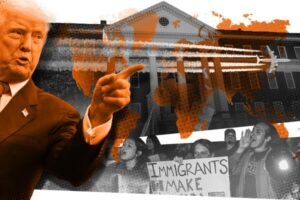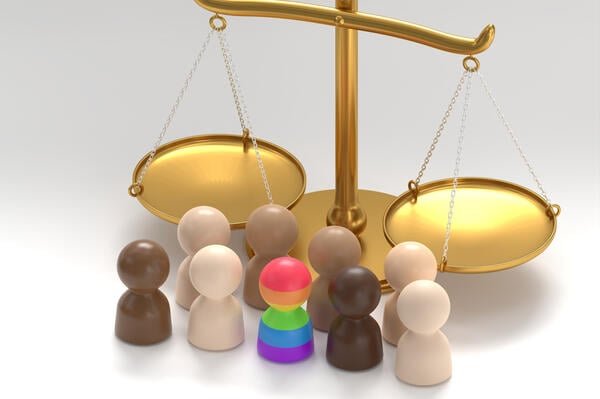Some DEI Programs Are Vulnerable, Not Illegal (opinion)
The Trump administration’s directives on diversity, equity and inclusion have wreaked havoc across the higher education landscape. Confusion persists about whether all DEI activities are forbidden or just ones that are officially illegal. To top it off, there’s much bewilderment about what exactly constitutes an “illegal DEI” activity.
The ambiguity is a feature, not a bug. When people are confused about what’s legal or not, they’ll overcorrect out of fear. As a result, we see colleges and universities scrubbing DEI websites and cutting diversity-related programming. The outcome? A hasty, often over-the-top retreat from efforts that serve students and faculty alike.
Critically, some of the programs deemed illegal by the Trump administration have not been ruled unlawful in the courts, such as scholarships and prizes that consider race or ethnicity in the selection process. The more accurate term to describe them is “vulnerable” rather than “illegal.” In Students for Fair Admissions v. Harvard, the Supreme Court specifically struck down a form of race-conscious admissions. While a court technically could apply SFFA in the future to render consideration of race in scholarships and recruitment efforts illegal, that day has yet to come, despite the current administration’s faulty interpretation of the ruling.
Even Ed Blum, who organized the SFFA lawsuits, acknowledges this distinction, as reported in Inside Higher Ed: “Blum doesn’t actually believe the [SFFA] decision itself extends to those programs [e.g., race-conscious scholarships, internships or pre-college programs]. He does think they’re illegal—there just hasn’t been a successful case challenging them yet.”
“I haven’t really made myself clear on this, which is my fault,” Blum told Inside Higher Ed in February, “but the SFFA opinion didn’t change the law for those policies.”
So what does that mean for colleges and universities? The fuzziness over the legality of traditional race-conscious scholarships and recruitment programs will remain until the question is decided by the courts. While the majority ruling in SFFA led some to assume that all race-conscious programs will be deemed unconstitutional, the outcome is unknown. Courts could view the stakes or dynamics of nonadmissions programs (e.g., scholarships, outreach) as differing enough from the hypercompetitive context of selective college admissions to allow continued consideration of race. Institutions and organizations could also argue that race-conscious programs are needed to address specific, documented historic discrimination. This argument is different from defending race-conscious initiatives due to broad societal discrimination, as noted by the nonpartisan Congressional Research Service.
Likely, many institutions and organizations will move away from using race/ethnicity in the selection process for scholarships and other nonadmissions programs, out of fear of litigation and threats of federal funding being withdrawn. However, they may retool selection processes to consider factors related to their missions and goals, such as prioritizing those who show a commitment to supporting historically underserved populations. Further, if the ruling in SFFA is going to be used to attack nonadmissions programs, we can’t forget that it also affirms the right of programs to consider individuals’ experiences related to race. As Chief Justice John Roberts wrote, “Nothing in this opinion should be construed as prohibiting universities from considering an applicant’s discussion of how race affected his or her life, be it through discrimination, inspiration, or otherwise.”
The Ph.D. Project, the focus of Title VI investigations by the Department of Education, is an example of a program that was, in prior iterations, vulnerable but not necessarily illegal. The department announced last month that it had launched investigations of 45 universities over their partnerships with the Ph.D. Project, alleging that the nonprofit, which offers mentorship, networking and support for prospective Ph.D. candidates in business, “limits eligibility based on the race of participants.”
The Ph.D. Project has already said that it changed its eligibility criteria earlier this year to be open to anyone who “is interested in helping to expand and broaden the pool of [business] talent”—so what will become of the investigations? Quite possibly, the Education Department will accuse institutions of breaking the law for partnering with an outreach program that in prior iterations considered race in its selection process—which is how the department likes to interpret SFFA, but that is still unsettled legal territory. Courts likely won’t hear a case on the Ph.D. Project because the program has already changed its selection criteria, so we still won’t know whether it’s legal or not to consider race in outreach programs. Until that question goes to court, we’ll probably have institutional decision-making driven more by the chilling effects of the Title VI investigations as opposed to actual law.
While programs that consider race in selection criteria are vulnerable, there are plenty of diversity-related programs and initiatives that are not, or should not be as long as they are open to all students. Programs like speaker series, workshops, lunch and learns, training programs, cultural events, resource websites, racial/ethnic or culturally focused student organizations, administrative infrastructure, and task forces related to advancing a more supportive and inclusive environment—all of these can continue to play a critical part in advancing an institution’s mission and goals.
In spite of this, the Trump administration recently proclaimed that DEI programs fuel “division and hatred” and ordered Harvard to “shutter such programs.” However, in previous communications, even the Trump administration has recognized that common DEI initiatives “do not inherently violate federal civil rights laws,” as noted by a group of leading law faculty. The directive to Harvard is serious overreach on multiple levels. We can only hope that Harvard will not capitulate to the administration’s demands and will defend its rights as an institution.
Over all, institutions must resist panic-driven overcorrections. When vulnerable programs are threatened, institutions with the resources to do so should defend them in court. In other circumstances, retooling programs, rather than eliminating them, may be necessary. Institutions should not abandon diversity, equity and inclusion efforts out of fear; instead, they should seek to support diversity both lawfully and well.
The Trump administration’s strategy is clear: sow doubt and encourage institutions to retreat. Instead of gutting diversity-related efforts wholesale, institutions need to take a more thoughtful approach. Our students depend on it, and so does the future of education.
You may be interested

Shoppers love shake with ‘172 health benefits’ who ‘feel more alert’
new admin - Apr 23, 2025Struggling to get your daily dose of greens? It might feel like a chore, but supplements can lend a hand,…

Orange County judge convicted of second-degree murder after killing wife in 2023
new admin - Apr 23, 2025Following a mistrial in March, jurors have found an Orange County Superior Court judge guilty of killing his wife after…

Ex-NFL star Donald Driver takes stance on trans athletes in women’s sports
new admin - Apr 23, 2025[ad_1] NEWYou can now listen to Fox News articles! Former Green Bay Packers star Donald Driver offered his stance on…
































